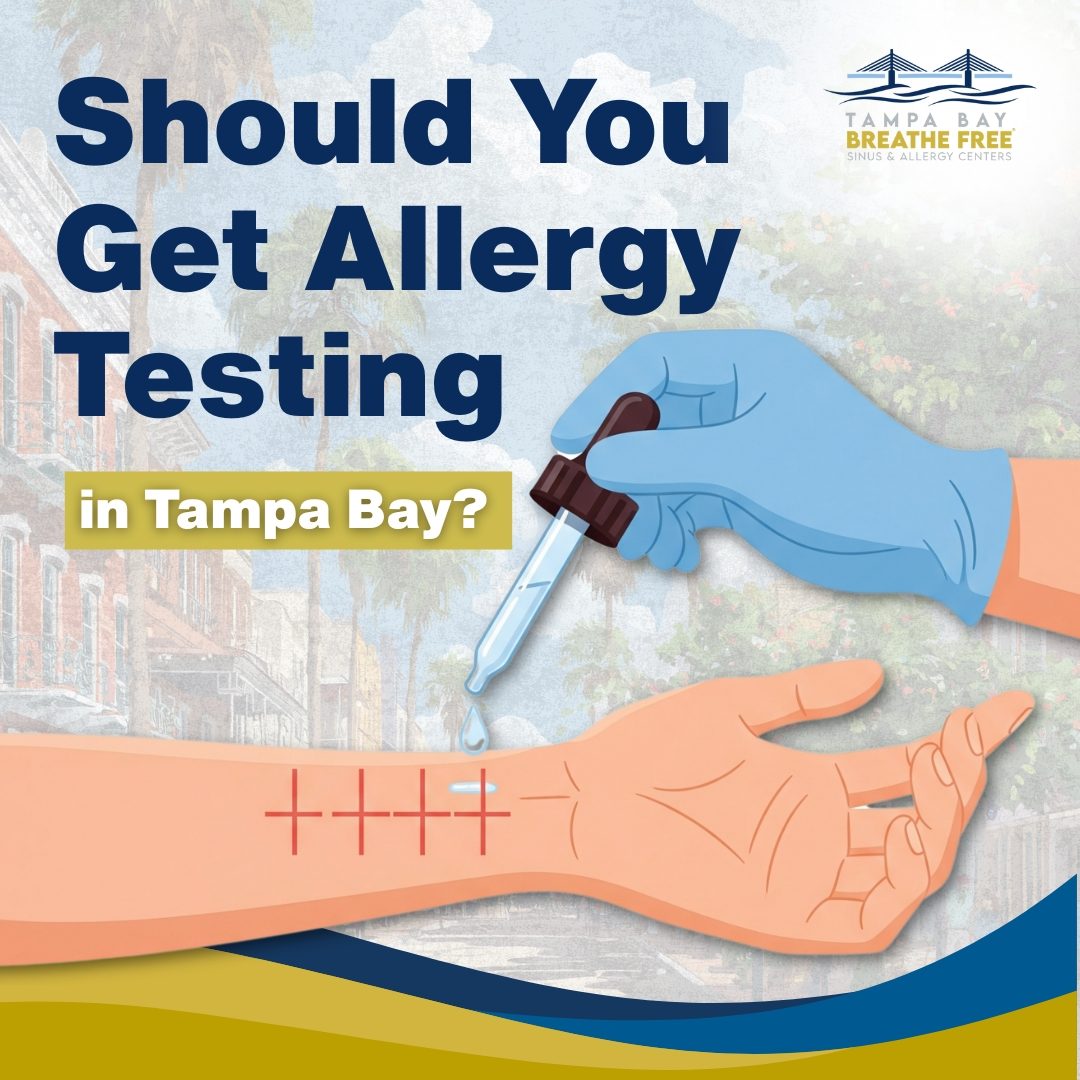.png)
Should You Get Allergy Testing in Tampa Bay?
If the changing weather in Tampa Bay brings more than a cool breeze—such as sneezing, congestion, or watery eyes—you may be dealing with seasonal or environmental allergies. Identifying the root cause of your symptoms is the first step toward effective management.
In this guide, we’ll break down the local allergy landscape in Florida and explain when allergy testing might be appropriate.

Tampa Bay’s Year-Round Allergy Environment
Florida’s warm, humid climate allows many allergens to thrive year-round. Unlike states with distinct allergy seasons, Tampa Bay residents may experience symptoms at nearly any time of year.
🌷 Spring (February – May)
- High tree pollen from oak, pine, cedar, and maple
☀️ Summer (June – August)
- Peak grass and weed allergens, including ragweed, Bermuda grass, Johnson grass, and Timothy grass
🍂 Fall (September – November)
- High ragweed pollen levels
- Increased mold spores due to damp, decaying foliage
❄️ Winter (December – January)
- Tree allergens (especially oak and pine) remain active
- Increased exposure to indoor allergens like dust mites and pet dander
When to Consider Allergy Testing
Allergy testing can help determine which substances may be triggering your symptoms. If you're experiencing any of the following signs, speak with a board-certified allergist to discuss whether testing is appropriate.
Airborne or Environmental Allergy Symptoms:
- Sneezing, nasal congestion, or runny nose
- Itchy, watery, or red eyes
- Postnasal drip
- Chronic cough or wheezing
- Headaches linked to sinus pressure
Food Allergy Symptoms:
- Skin reactions (e.g., hives, itching, swelling)
- Gastrointestinal symptoms (e.g., nausea, vomiting, abdominal pain)
- Difficulty breathing, tightness in throat or chest
- Dizziness or lightheadedness
Contact Allergy Symptoms (Latex, Fragrances, Metals):
- Localized rashes, hives, or itching
- Blisters or skin inflammation
- Burning or stinging sensation after contact
If symptoms are persistent, worsening, or unclear, allergy testing may provide valuable insight for diagnosis and treatment planning.
What Happens During Allergy Testing?
Each individual’s allergy profile is unique. Allergy testing helps identify the specific substances causing symptoms so your care provider can recommend a personalized treatment plan, which may include medications or immunotherapy.
At Tampa Bay Breathe Free, our team may recommend one or more of the following:
✅ Skin Prick Test
- Commonly performed on the forearm
- A small amount of each allergen is applied to the skin using a gentle scratch or prick
- Reactions are measured to identify sensitivities
✅ Intradermal Skin Test
- A small amount of allergen is injected just beneath the skin
- Often used when skin prick results are inconclusive or mild
✅ Blood Allergy Testing
- May be recommended in specific cases:
- History of severe allergic reactions (e.g., anaphylaxis)
- Skin conditions (like eczema or psoriasis) that interfere with skin testing
- Certain medications that cannot be stopped before testing
- History of severe allergic reactions (e.g., anaphylaxis)
Allergy testing is considered safe and clinically validated for both children and adults when performed by a qualified provider.
Why Allergy Testing Matters in Tampa Bay
Because Tampa Bay’s allergy season can last year-round, identifying your specific triggers can make a meaningful difference in how you manage symptoms. With guidance from an allergy specialist, you can:
- Avoid or minimize exposure to confirmed allergens
- Choose medications or therapies that directly target your condition
- Explore long-term management options like sublingual immunotherapy (allergy drops)
Looking for Allergy Relief in Tampa Bay?
If you’re ready to learn more about what’s triggering your allergy symptoms, Tampa Bay Breathe Free offers comprehensive allergy evaluation and testing. Our team can help determine if testing is appropriate and discuss your options for treatment and symptom management.
📍 Serving patients throughout Tampa, St. Petersburg, Clearwater, and surrounding communities.
Schedule a consultation to start your personalized allergy care plan today.
The information provided in this article is for informational and educational purposes only and does not constitute medical advice. It is not intended to diagnose, treat, cure, or prevent any disease or medical condition. Always seek the guidance of your physician or other qualified healthcare provider with any questions you may have regarding a medical condition or treatment.
Results may vary: Treatment outcomes and health experiences may differ based on individual medical history, condition severity, and response to care.
Emergency Notice: If you are experiencing a medical emergency, call 911 or seek immediate medical attention.




